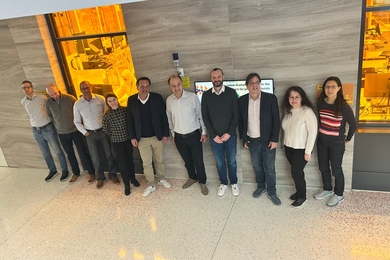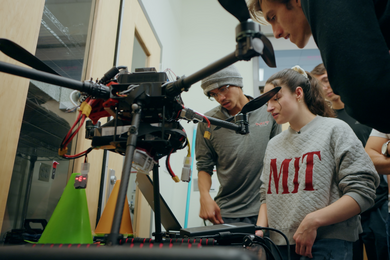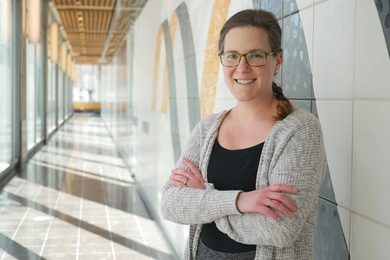��������� At the annual meeting of the Society of College and University Planning in Denver last month, O. Robert Simhawas awarded the Society's Distinguished Service Award. Mr. Simha, who was the director of planning at MIT for many years and is now special advisor to the executive vice president, is a founding member and past president of the society.
������
��������� Philip S. Khoury, dean of the School of Humanities and a member of the Trinity College Class of 1971, has been elected by fellow Trinity alumni as an alumni representative to the college's board of trustees. Alumni trustees serve one six-year term that is not renewable.
������
��������� Four from the Center for Space Research (CSR) -- director and Professor Claude Canizares, principal research scientist Marshall Bautz, CSR associate director William Mayer and research staff member Eugene Galton -- and aeronautics and astronautics lecturer Lorraine Fesq received NASA Public Service Medals on June 20. They were among the 99 who got medals awarded by the space agency to individuals not employed by the government for exceptional contributions to the mission of NASA. The MIT recipients were recognized for their contributions to the Chandra X-ray Observatory mission, managed by NASA's Marshall Space Flight Center in Huntsville, AL.
������
��������� Matthew Anderson, a research affiliate in the Center for Cancer Research, is one of 25 scientists to receive a Burroughs Wellcome Fund Career Award in the Biomedical Sciences. The awards provide support ranging from $445,000 for four years to $574,000 for six years to bridge advanced postdoctoral training and the first three years of faculty service. Dr. Anderson's award will fund his research into the role of T-type calcium channels in thalamic and hippocampal rhythmic activity.
������
��������� Professor L. Rafael Reif, associate department head of electrical engineering and computer science, has received the 2000 Aristotle Award from the Semiconductor Research Corp. The award recognizes outstanding teaching by SRC-supported faculty, emphasizing student advising and research-project teaching.
������
��������� The National Academy of Engineering has selected Professor Alexander Slocum of mechanical engineering to participate in its Frontiers of Engineering symposium in September. The three-day event brings together outstanding engineers from industry, academia and government to discuss pioneering technical work in various engineering fields.
������
��������� The American Society of Heating, Refrigeration and Air Conditioning Engineers, Inc. bestowed a poster presentation award on Qingyan Chen, associate professor of building technology in the Department of Architecture, at its annual meeting in June. Dr. Chen co-authored a paper titled "Validation of a Zero-Equation Turbulence Model for Complex Indoor Airflow Simulation." He also was recognized for co-authoring another paper, "Performance Evaluation and Design Guidelines for Displacement Ventilation."
������
��������� Professor of Industrial Microbiology Arnold L. Demain received an honorary doctorate from Michigan State University, where he received his BS and MS degrees in 1949 and 1950. He also has been elected to the American Academy of Microbiology's board of governors. In addition, Professor Demain was honored with the Order of the Rising Sun, Gold Rays With Neck Ribbon from the Japanese government, recognizing "his eminent work over the years in advancing the fields of applied microbiology and bioscience/bioengineering" and in guiding a large number of researchers from Japan.
������
��������� President Charles M. Vest has received the Arthur M. Bueche Award in recognition of outstanding university leadership, commitment and effectiveness in helping mold government policy in support of research, and forging links between academia and industry, from the National Academy of Engineering. He will receive the award at the NAE annual meeting in October.
������
��������� Lisa M. Zurk, a technical staff member in Lincoln Laboratory's Advanced Array Technology Group, has been awarded a Fulbright grant in mathematics to lecture and do research at the University of Helsinki in 2000-01. She will investigate electromagnetic and acoustic wave propagation and scattering in stochastic media at the Rolf Nevanlinna Institute.
������
��������� Professor of the History and Philosophy of Science Evelyn Fox Keller delivered the Commencement address at New School University in New York on May 23. She also was awarded an honorary degree by the university.
������
��������� Two MIT faculty members in the Department of Electrical Engineering and Computer Science have won awards from the Institute of Electrical and Electronic Engineers. Professor Sanjoy K. Mitter, director of the Center for Intelligent Control Systems and co-director of the Laboratory for Information and Decision Systems, received the IEEE Control Systems Award "for contributions to optimization, optimal control and nonlinear filtering, and for interdisciplinary research that has expanded the boundaries of control theory."
Ronald Rivest, the E.S. Webster Professor of Computer Science and Engineering, received the IEEE Koji Kobayashi Computers and Communications Award "for the revolutionary invention of the RSA public key cryptosystem, which is the first to be widely adopted."
������
��������� Professor Stephen Ansolabehere of political science is one of 12 members of the first class of Carnegie Scholars receiving awards of up to $100,000 apiece over the next two years for policy-focused research in areas of interest to the Carnegie Corporation. Recipients will pursue subjects including education reform, global income gaps, conflict resolution among new nations, and African women and Islam. Professor Ansolabehere's research title is "The Rise of Money in American Elections."
������
��������� Jeffrey I. Schiller, network manager in Information Systems, has been named the inaugural winner of the Educause Award for Leadership in Information Technology. The new award recognizes "visionary achievement and effectiveness in identifying and advancing technology directions for the various needs of higher education." Educause is an international nonprofit association that aims to help shape higher education through the introduction, use and management of information resources and technologies in teaching, learning, scholarship, research and institutional management.
������
��������� Thomas H. Lee, senior lecturer and the Philip Sporn Professor of Energy Processing Emeritus in the Department of Electrical Engineering and Computer Science, has been selected as a foreign member of the Chinese Academy of Engineering.
������
��������� Professor of Chemistry Timothy M. Swager will receive the 2000 Arthur C. Cope Scholar Award from the American Chemical Society for making innovative use of active plastics -- specifically, to detect landmines. His landmine-detecting polymer is so sensitive that it will react to as few as 100,000 molecules of TNT -- about 38 billion-billionths of a gram wafting up from a landmine. Modern landmines use little metal, and dogs trained to smell TNT are presently the best means of detecting them. He also is designing active polymers that conduct electrical currents. "Computers are getting so small that we'll soon need to control their electronics on a molecular level," he said. His award includes $5,000 and a $40,000 unrestricted research grant.
������
���������Professor Evan Ziporyn, an expert on the Balinese gamelan and composer for combined ensembles of gamelan and western instruments, was one of 26 composers awarded a commissioning grant from Meet the Composer's "Commissioning Music/USA 2000" program. The grant allows Professor Ziporyn to compose a 20-minute multimovement work for string trio that will premiere in April 2001 in a performance by the nationally known Arden Trio. Meet the Composer is a national organization serving composers of every kind of music by fostering the creation, performance, dissemination and appreciation of their work.
A version of this article appeared in MIT Tech Talk on August 9, 2000.





